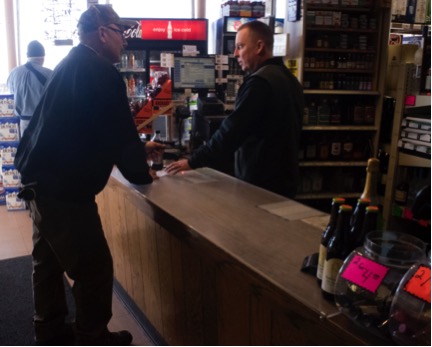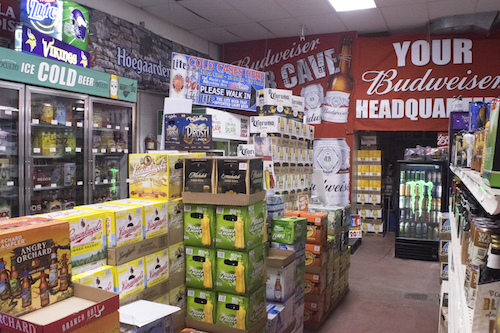By Samantha Stetzer
“Stores in Winona will be somewhat disappointed in Sunday sales,” Wisconsin Liquor storeowner Dave Pirkl said. “Careful what you wish for over there.”
There’s no resting on Sundays for the employees of Wine House, a liquor store nestled partially up the bluffs along Bluff Siding, Wisconsin, since 1951.
Sundays are their busiest day of the week, according to seven-year owner Dave Pirkl. The main pull for its Sunday sales stemmed from a law in Minnesota barring alcohol sales on Sunday, Pirkl said.
That is about to change.

With an 88-39 vote in the Minnesota House of Representatives, a 38-28 vote in the Senate and a signature by Minnesota Governor Mark Dayton, Minnesota liquor stores will now be able to sell their product on Sundays between 11 a.m. and 6 p.m.
The law goes into effect on July 1, with liquor stores opening their doors on a Sunday for the first time the following day.
Minnesota Rep. Gene Pelowski, who serves Winona County, said he supported the bill largely because of the competition across the border in Wisconsin and the public support it was gaining.
“It certainly does have an impact,” Pelowski said, adding there was not much debate within the house about ridding the state of its more than 150-year-old law barring the Sunday sales.
Minnesota Senator Jeremy Miller, who also represents Winona, helped co-author the new law because of the same public support.
“They feel it’s ridiculous that stores don’t have the option to be open on Sundays,” Miller said. “This was the strongest grassroots effort by the people that I’ve seen on any issue during my time in the Senate.”
Since entering the senate in 2011, Miller worked on flipping the law to allow Sunday liquor sales because he said he believes publically and politically Sunday should be viewed as the same as every other day of the week.
Miller he did not get the exact bill he said he originally wanted.
The original bill did not have any time restrictions on the Sunday sales. Working with religious leaders and compromising with other members of the Minnesota legislature, the bill was able to pass with the 11 a.m. to 6 p.m. time limit, according to Miller.
“To me it really comes down to, the people wanted to be able to buy their beer, wine and liquor on Sundays in Minnesota,” Miller said. “They should have the option.”
Darin Egeland, storeowner of Warehouse Liquor in Winona, said the new option for consumers is an opportunity for business owners to have another day for revenue.
Egeland said he will open on Sundays because he said stores on border towns in Minnesota “almost have to” to cash in on the money that could stay in Minnesota.
“I would say we’d lost money across the border,” Egeland said.

Egeland said he is not sure he can get his employees to agree to work another day during the week, and opening on a day he has designated as a day off is not something he is excited about.
Still, he added the possibility of increased revenue is hopeful for him and his little store at the intersection of Market and Third streets in Winona.
As for his competition across the border, Egeland said he believes the Wine House will struggle with the new change.
“He’ll probably be crying,” Egeland said about Pirkl. “For him it’s going to be a kick in the ass.”
While he supported opening his store on Sunday, Egeland is most worried about the possibilities of the legislature lifting restrictions on grocery stores and gas stations selling alcohol in Minnesota. Currently, Minnesota statutes state liquor establishments must be used to sell primarily alcohol, according to state statute 340A.412
Other stores can get around this law by having their own liquor store building next to their establishment or selling malt liquor with an alcohol content of 3.2 or less, according to state statute 340A.403.
If the law changes to allow establishments like convenience stores, grocery stories and drugstores to sell liquor inside the store—such as what is currently allowed in Wisconsin, according to Chapter 125 of the Wisconsin Statutes—Egeland said he fears it will put him and his local competitors out of business.
His distributor, Chris Schafer from Schott Distributing in Rochester,
Minnesota, said their company is also against cutting the restriction on convenience and grocery stores because of the added work without proper compensation it would cause.
According to Schafer, the company would not necessarily gain massive amounts of money or accounts, but rather, they would have to increase the flow of alcohol across the areas they distribute to, causing a mass overhaul in the company dynamic.
“It’s going to kill us,” Schafer said.
Schafer said he supported the Sunday sales bill in Minnesota.
Despite fears by local owners and distributors, Pelowksi and Miller said they do not foresee more changes to the Minnesota laws in the near future.
“I think this is the biggest change you’re going to see for a long time,” Pelowski said.
Miller added, “I don’t think the appetite is there in the Senate to do more than what we already did. Allowing liquor stores to be open on Sundays was a big step forward for the legislature, and I don’t anticipate any further progress.”
Pirkl, who has only owned a store in a state where grocery stores can sell booze and Sunday sales are not restricted, admitted the initial change to the Minnesota law may impact his business negatively. He added he cannot know until a year after the law is in effect what that change will be.
While Wisconsin laws allow grocery stores and convenience stores in Wisconsin to sell alcohol of all kinds, Pirkl said he does not have to compete much against the bigger box stores since there is a minimum mark-up law in Wisconsin.
This law, under the Wisconsin Unfair Sales Act, essentially restricts the large retail stores from selling at a cheaper price than what smaller businesses can. As a small business, this means Pirkl can compete with larger chains that can sell alcohol in Wisconsin, such as Kwik Trip or Festival Foods.
For the last seven years, Sundays have always been a bonus day for the Wine House, Pirkl said, but even with the new Minnesota law, he said he is confident his “loyal customers,” legal ability to sell Wisconsin beers and wines, such New Glarus beers and Elmaro wines, and Wisconsin’s lack of restrictions on his open hours on Sunday are what will keep his Sunday sales up.
He added his location along the Wisconsin border will also benefit him, since community members in small towns along the river do not have many options to buy alcohol.
Pirkl said he does not have much confidence for his added border competition.
“Stores in Winona will be somewhat disappointed in Sunday sales,” Pirkl said. “Careful what you wish for over there.”
